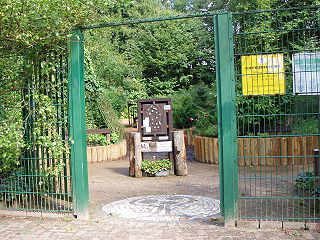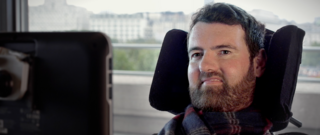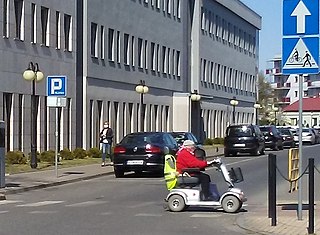
Assistive technology (AT) is a term for assistive, adaptive, and rehabilitative devices for people with disabilities and the elderly. Disabled people often have difficulty performing activities of daily living (ADLs) independently, or even with assistance. ADLs are self-care activities that include toileting, mobility (ambulation), eating, bathing, dressing, grooming, and personal device care. Assistive technology can ameliorate the effects of disabilities that limit the ability to perform ADLs. Assistive technology promotes greater independence by enabling people to perform tasks they were formerly unable to accomplish, or had great difficulty accomplishing, by providing enhancements to, or changing methods of interacting with, the technology needed to accomplish such tasks. For example, wheelchairs provide independent mobility for those who cannot walk, while assistive eating devices can enable people who cannot feed themselves to do so. Due to assistive technology, disabled people have an opportunity of a more positive and easygoing lifestyle, with an increase in "social participation", "security and control", and a greater chance to "reduce institutional costs without significantly increasing household expenses." In schools, assistive technology can be critical in allowing students with disabilities to access the general education curriculum. Students who experience challenges writing or keyboarding, for example, can use voice recognition software instead. Assistive technologies assist people who are recovering from strokes and people who have sustained injuries that affect their daily tasks.

Accessibility is the design of products, devices, services, vehicles, or environments so as to be usable by people with disabilities. The concept of accessible design and practice of accessible development ensures both "direct access" and "indirect access" meaning compatibility with a person's assistive technology.
The disability rights movement is a global social movement that seeks to secure equal opportunities and equal rights for all people with disabilities.

A sensory garden is a self-contained garden area that allows visitors to enjoy a wide variety of sensory experiences. Sensory gardens are designed to provide opportunities to stimulate the senses, both individually and in combination, in ways that users may not usually encounter.

A wheelchair ramp is an inclined plane installed in addition to or instead of stairs. Ramps permit wheelchair users, as well as people pushing strollers, carts, or other wheeled objects, to more easily access a building, or navigate between areas of different height. Ramps for accessibility may predate the wheelchair and are found in ancient Greece.

Crippled: Austerity and the Demonization of Disabled People is a 2019 book by Frances Ryan about disability in the United Kingdom under the 2010s austerity programme. It explores the effects of welfare cuts, local council cuts, social care cuts, increased taxes for disabled people and means testing for remaining welfare provisions. Between research about the prevalence of each issue, Ryan interviews disabled people affected by the issue. She finds people who have died from having financial support withdrawn, people who cannot afford food, heating or prescriptions, and people unable to wash or get dressed due to removal of social care. Ryan researches into disabled people who live in inaccessible housing, who cannot afford visits to the hospital, who cannot leave violent partners for financial reasons and who rely on young children to look after them.

The Royal United Hospital (RUH) is a major acute-care hospital in the Weston suburb of Bath, England, which lies approximately 1.5 miles (2.4 km) west of the city centre. The hospital has 565 beds and occupies a 52 acres (21 ha) site. It is the area's major accident and emergency hospital, with a helicopter landing point on the adjacent Lansdown Cricket Club field. The hospital is operated by the Royal United Hospitals Bath NHS Foundation Trust.

Accessible tourism is the ongoing endeavor to ensure tourist destinations, products, and services are accessible to all people, regardless of their physical or intellectual limitations, disabilities or age. It encompasses publicly and privately owned and operated tourist locations. The goal of accessible tourism is to create inclusivity of all including those traveling with children, people with disabilities, as well as seniors. This allows those with access requirements to be able to function as an independent using products following the universal design principle, a variety of services, and different environments.
The Disabled Persons Railcard is a concessionary fare scheme in the United Kingdom giving eligible passengers with disabilities benefits on the National Rail network including a 1/3 discount on fares.
Motability is a charity in the United Kingdom. It oversees Motability Operations Ltd, which runs the Motability Scheme intended to enable disabled people, their families and their carers to lease a new car, scooter or powered wheelchair, using their disability benefit. According to its response to a UK Government inquiry in 2019 into enhancing mobility for disabled citizens, Motability had over 620,000 customers. According to Citizen's Advice, access to the charity's support to pay for a car is dependent on eligibility relative to mobility conditions in government schemes, including: Disability Living Allowance (DLA), Personal Independence Payment (PIP), Armed Forces Independence Payment (AFIP) or War Pensioners’ Mobility Supplement. Motability's 2019/2020 audit document reported 94% of persons using Motability's scheme to buy a car either have a physical disability or long term health condition. In 2018, the National Audit Office praised the customer satisfaction rates for the service, but criticized the profit and reserve levels the charity held. They also noted criticized its governance and "executive remuneration." A response to a 2019 parliamentary committee to release £343 million of its £2.5bn reserve was greeted as a "first step" to making best use of its "vast sums."

A wheelchair is a mobilized form of chair using 2 or more wheels, a footrest and armrest usually cushioned. It is used when walking is difficult or impossible to do due to illnesses, injury, disabilities, or age related health conditions.

High-floor describes the interior flooring of commuter vehicles primarily used in public transport such as trains, light rail cars and other rail vehicles, along with buses and trolleybuses. Interior floor height is generally measured above the street surface or above the top of the rail. High-floor designs usually result from packaging requirements: mechanical items such as axles, motors, crankshafts, and/or transmissions, or luggage storage spaces are traditionally placed under the interior floor of these vehicles. The term is used in contrast with low-floor designs, which offer a decreased floor and entry height above the street surface. Since low-floor designs generally were developed after high-floor vehicles, the older high-floor design is sometimes also known as conventional or the “traditional” design.

Invalid carriages were usually single seater road vehicles, buggies, or self-propelled vehicles for disabled people. They pre-dated modern electric mobility scooters and, from the 1920s, were generally powered by small gasoline/petrol engines, although some were battery powered. They were usually designed without foot-operated controls.
Disability in the United Kingdom covers a wide range of conditions and experiences, deeply impacting the lives of millions of people. Defined by the Equality Act 2010 as a physical or mental impairment with a substantial and long-term adverse effect on a person's ability to carry out normal day-to-day activities, it encompasses various aspects of life, including demographics, legislation, healthcare, employment, and culture. Despite numerous advancements in policy and social attitudes, individuals with disabilities often encounter unique challenges and disparities.

Midpark Hospital is a modern acute mental health unit located in Dumfries. The hospital is managed by NHS Dumfries and Galloway.

Euan MacDonald MBE is a Scottish entrepreneur. He studied at the University of St Andrews and the University of Edinburgh. MacDonald was diagnosed with Motor Neurone Disease (MND) in October 2003.
Create is a UK creative arts charity based in London and Manchester, which offers creative workshops and arts experiences led by professional artists in community settings, schools, day centres, prisons and hospitals.

Geography of disability is a multi-disciplinary branch of human geography which studies the experiences of people with disabilities and the extent to which disability in a population can be influenced by its geographical location. Potential components of studies in a geographical analysis include the environment, politics, incidental and additional supports, and the socio-economic landscape of the region being examined. This field has become increasingly important as policymakers have become aware of the need to ensure equal access to community resources for all individuals, regardless of mobility challenges.
Maggie Davis and her husband Ken followed the Independent Living Movement, opening a housing scheme in the UK at Grove Road, Sutton-in-Ashfield in 1976. They, along with other members Paul Hunt and Vic Finkelstein, of the Union of the Physically Impaired Against Segregation (UPIAS), initiated the ideas that led to the development of the social model of disability.

Marilyn E. Saviola was an American disability rights activist, executive director of the Center for the Independence of the Disabled in New York from 1983 to 1999, and vice president of Independence Care System after 2000. Saviola, a polio survivor from Manhattan, New York, is known nationally within the disability rights movement for her advocacy for people with disabilities and had accepted many awards and honors for her work.














